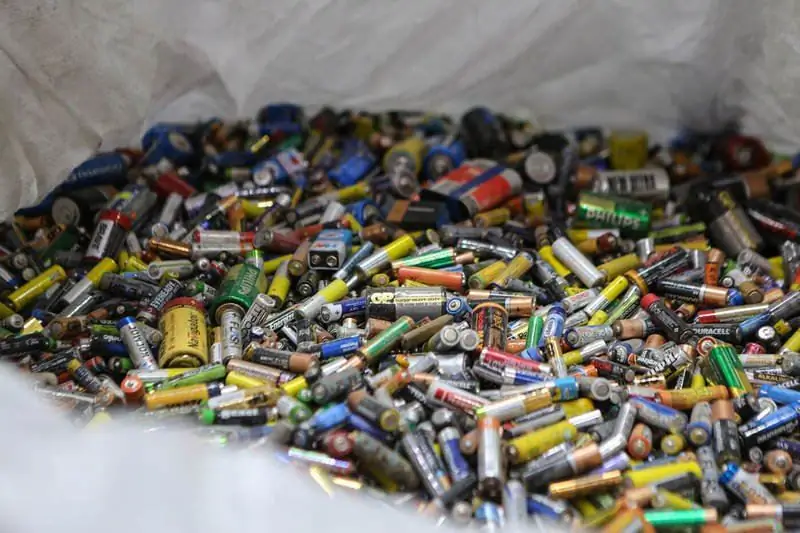
Table of contents:
- Author Bailey Albertson [email protected].
- Public 2023-12-17 12:53.
- Last modified 2025-01-23 12:41.
Why batteries shouldn't be thrown in the trash and what to do with them

Are you thinking about protecting the environment? Looking for what one person can do to cleanse her? In fact, a lot of things - and you can start by disposing of batteries.
Why you shouldn't throw batteries in the trash can
Each battery (regardless of its type) has a special icon, which indicates that it should not be thrown away with ordinary waste.

A crossed-out container indicates that the product requires special disposal conditions.
A standard battery or "finger" battery contains:
- lead;
- nickel;
- cadmium;
- lithium;
- sometimes mercury.
All these are toxic metals that can harm not only the environment, but also the person himself. For example, cadmium causes kidney failure and can trigger cancer, lead and mercury negatively affect the human nervous system, bones and liver.
As long as the battery is working, there is nothing to worry about - it is covered with a housing that completely protects you from the negative effects of all these substances. But as soon as she gets to the landfill (where all the garbage from your bucket is sent), completely different rules begin to apply.
Under the influence of corrosion, the protective shell breaks through, and through the gaps in it, toxic metals can get directly into the soil, penetrate into groundwater. This logically leads to a deterioration in the health of animals, birds, fish and plants living nearby. They start to get sick and waste away; plants stop growing, and animals may experience pathologies that manifest themselves in subsequent generations.
But that's not all. When the garbage reaches the incineration plant, all toxic substances begin to spread through the air.
Metals from batteries can enter the human body in two ways - through inhaled air (after burning batteries) or together with food and water, the raw materials for which were taken from a contaminated area.
Unfortunately (or fortunately), there is no fine in Russia for violating the rules for disposing of batteries. Throwing batteries in the trash will only be on your conscience.
What to do with used batteries
If the batteries can't just be thrown away, how do you get rid of them? For this purpose, there are special waste treatment facilities. They are in many large cities, and their task is to accept hazardous or harmful items for disposal.
You can use the Recycle Map to find the nearest recycling point. Select your city from the menu on the left and then check the type of waste you want to recycle. Points will be marked on the map where you can go for proper disposal.

If you have enabled access to the geolocation, the site will immediately suggest the nearest points to you
Batteries can also be disposed of in special containers located in some supermarkets and hypermarkets. In Russia, this is not yet very common, but some European companies are trying to popularize this idea. For example, every IKEA has a similar container for used batteries and accumulators.
If your city does not have waste recycling facilities, try to find any environmental protection organizations - they may be active in your community. If there are none, then there are not so many options - either continue to throw the batteries in the trash, or put the used ones in some box and, if possible, take them to the nearest city where there are waste collection points.
What else is worth taking to recycling points
In addition to batteries, hazardous waste includes:
- lighters. Even if you are sure that there is no fuel left in the lighter, it still remains flammable, so it is better to hand it over to a waste collection point;
- fluorescent light bulbs (contain toxic chemicals);
- household appliances, computers, electronics - they all work on more or less toxic metals, and also contain scanty amounts of gold, silver or platinum that can be recycled;
- aerosols (including empty cans). They contain toxic gases and chemicals;
- Medicines (also contain powerful chemicals that can affect soil or water in unpredictable ways)
- tires. Tires thrown to the side of the road or left somewhere in a forest belt are not only uncivilized, but also dangerous for the environment. It is better to hand them over for recycling - usually this is done either by tire centers or by the manufacturers themselves.
Caring for the environment starts with everyone's personal responsibility. By gradually accustoming ourselves to everyday and uncomplicated, but important actions, we can gradually improve the ecological state of the planet.
Recommended:
Why You Can't Why You Can't Wash Floors On Friday: Signs And Facts

Why you can't wash floors on Friday: signs and superstitions. The opinion of the mystics and Orthodoxy
Why You Can't Throw Bread In The Trash

Why is it considered that it is impossible to throw bread in the trash. What to do with a spoiled product
Why You Can't Take Out The Trash In The Evening: Signs And Facts

Why you can't take out the trash in the evening: what the signs and common sense say
Why You Can't Throw Away Old Things

Why it is believed that you can not throw your old things away. What to do with unnecessary things to get rid of them
Why You Can't Throw Your Hair In The Trash

Why you shouldn't throw your hair in the trash. How to properly get rid of cut hair
